高校教师资格证试讲教案-英语
教资英语面试试讲教案模板
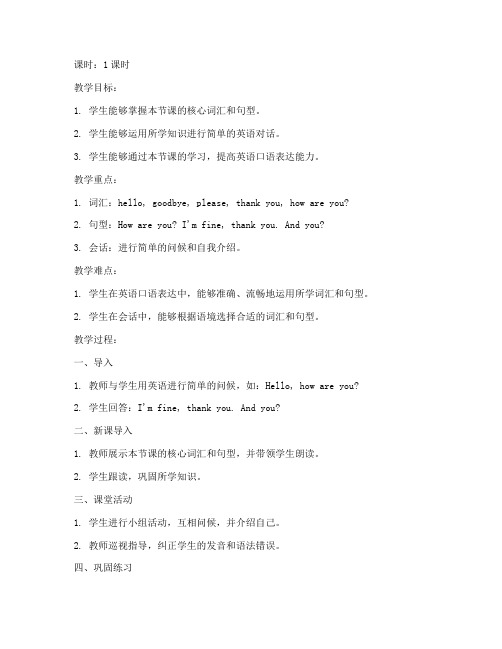
课时:1课时教学目标:1. 学生能够掌握本节课的核心词汇和句型。
2. 学生能够运用所学知识进行简单的英语对话。
3. 学生能够通过本节课的学习,提高英语口语表达能力。
教学重点:1. 词汇:hello, goodbye, please, thank you, how are you?2. 句型:How are you? I'm fine, thank you. And you?3. 会话:进行简单的问候和自我介绍。
教学难点:1. 学生在英语口语表达中,能够准确、流畅地运用所学词汇和句型。
2. 学生在会话中,能够根据语境选择合适的词汇和句型。
教学过程:一、导入1. 教师与学生用英语进行简单的问候,如:Hello, how are you?2. 学生回答:I'm fine, thank you. And you?二、新课导入1. 教师展示本节课的核心词汇和句型,并带领学生朗读。
2. 学生跟读,巩固所学知识。
三、课堂活动1. 学生进行小组活动,互相问候,并介绍自己。
2. 教师巡视指导,纠正学生的发音和语法错误。
四、巩固练习1. 学生进行角色扮演,模拟实际生活中的场景,如:在机场、车站、商场等。
2. 教师给予评价和指导。
五、总结1. 教师对本节课所学内容进行总结,强调重点和难点。
2. 学生复述本节课所学知识。
六、作业布置1. 学生课后复习本节课所学词汇和句型。
2. 学生尝试用所学知识进行简单的英语对话。
教学反思:1. 教师在教学中要注意学生的发音和语法错误,及时给予纠正。
2. 教师应鼓励学生积极参与课堂活动,提高学生的口语表达能力。
3. 教师要根据学生的实际情况,调整教学方法和进度,使每个学生都能有所收获。
大学英语教师试讲试讲教案
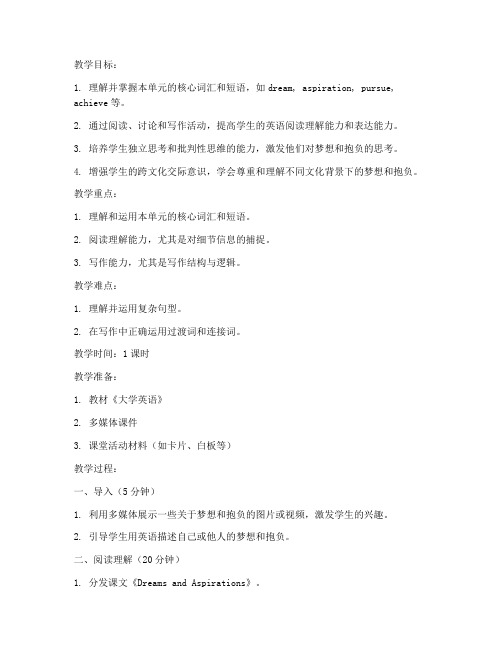
教学目标:1. 理解并掌握本单元的核心词汇和短语,如dream, aspiration, pursue, achieve等。
2. 通过阅读、讨论和写作活动,提高学生的英语阅读理解能力和表达能力。
3. 培养学生独立思考和批判性思维的能力,激发他们对梦想和抱负的思考。
4. 增强学生的跨文化交际意识,学会尊重和理解不同文化背景下的梦想和抱负。
教学重点:1. 理解和运用本单元的核心词汇和短语。
2. 阅读理解能力,尤其是对细节信息的捕捉。
3. 写作能力,尤其是写作结构与逻辑。
教学难点:1. 理解并运用复杂句型。
2. 在写作中正确运用过渡词和连接词。
教学时间:1课时教学准备:1. 教材《大学英语》2. 多媒体课件3. 课堂活动材料(如卡片、白板等)教学过程:一、导入(5分钟)1. 利用多媒体展示一些关于梦想和抱负的图片或视频,激发学生的兴趣。
2. 引导学生用英语描述自己或他人的梦想和抱负。
二、阅读理解(20分钟)1. 分发课文《Dreams and Aspirations》。
2. 学生快速阅读课文,了解文章大意。
3. 指导学生找出并解释本单元的核心词汇和短语。
4. 学生分组讨论,分析文章中的复杂句型,并举例说明。
三、课堂活动(20分钟)1. 分组讨论:学生分成小组,讨论以下问题:- 你有什么梦想和抱负?- 你认为实现梦想和抱负需要哪些条件?- 你将如何努力实现自己的梦想和抱负?2. 小组代表分享讨论结果,其他学生进行补充和评价。
四、写作练习(15分钟)1. 学生根据讨论结果,撰写一篇关于自己梦想和抱负的短文。
2. 教师提供写作指导,强调文章的结构和逻辑。
五、总结与反馈(5分钟)1. 教师总结本节课的重点内容,强调核心词汇和短语。
2. 学生分享自己的写作成果,教师进行点评和反馈。
教学反思:1. 本节课通过阅读、讨论和写作活动,提高了学生的英语阅读理解能力和表达能力。
2. 学生在写作过程中,学会了正确运用过渡词和连接词,使文章结构更加清晰。
高校教资英语试讲教案模板
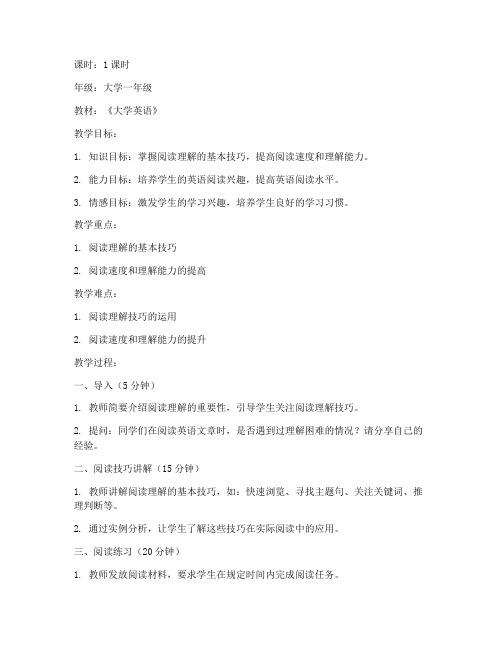
课时:1课时年级:大学一年级教材:《大学英语》教学目标:1. 知识目标:掌握阅读理解的基本技巧,提高阅读速度和理解能力。
2. 能力目标:培养学生的英语阅读兴趣,提高英语阅读水平。
3. 情感目标:激发学生的学习兴趣,培养学生良好的学习习惯。
教学重点:1. 阅读理解的基本技巧2. 阅读速度和理解能力的提高教学难点:1. 阅读理解技巧的运用2. 阅读速度和理解能力的提升教学过程:一、导入(5分钟)1. 教师简要介绍阅读理解的重要性,引导学生关注阅读理解技巧。
2. 提问:同学们在阅读英语文章时,是否遇到过理解困难的情况?请分享自己的经验。
二、阅读技巧讲解(15分钟)1. 教师讲解阅读理解的基本技巧,如:快速浏览、寻找主题句、关注关键词、推理判断等。
2. 通过实例分析,让学生了解这些技巧在实际阅读中的应用。
三、阅读练习(20分钟)1. 教师发放阅读材料,要求学生在规定时间内完成阅读任务。
2. 学生在阅读过程中,运用所学的阅读技巧,提高阅读速度和理解能力。
3. 教师巡回指导,解答学生在阅读过程中遇到的问题。
四、阅读总结(10分钟)1. 学生分享阅读过程中的收获和体会,教师进行点评。
2. 教师总结阅读理解技巧,强调在阅读过程中的重要性。
五、课堂小结(5分钟)1. 教师总结本节课的主要内容,强调阅读理解技巧在英语学习中的重要性。
2. 鼓励学生在课后继续练习阅读,提高英语阅读水平。
教学反思:本节课通过讲解阅读理解的基本技巧,引导学生关注阅读理解的重要性,并在练习环节让学生运用所学技巧,提高阅读速度和理解能力。
在教学过程中,教师应注意以下几点:1. 注重学生的主体地位,引导学生积极参与课堂活动。
2. 针对不同学生的阅读水平,进行分层教学,确保每个学生都能有所收获。
3. 加强课堂互动,鼓励学生提问、分享,提高课堂氛围。
4. 关注学生的学习效果,及时调整教学策略,确保教学目标的实现。
课后作业:1. 完成课后阅读材料,提高阅读速度和理解能力。
高校教师资格试讲教案模板
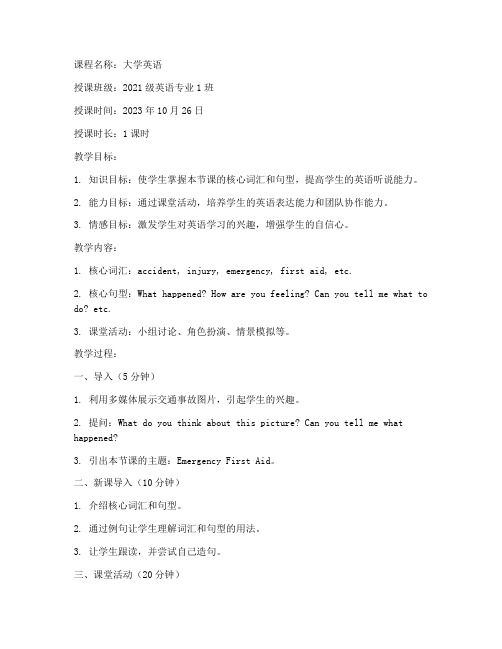
课程名称:大学英语授课班级:2021级英语专业1班授课时间:2023年10月26日授课时长:1课时教学目标:1. 知识目标:使学生掌握本节课的核心词汇和句型,提高学生的英语听说能力。
2. 能力目标:通过课堂活动,培养学生的英语表达能力和团队协作能力。
3. 情感目标:激发学生对英语学习的兴趣,增强学生的自信心。
教学内容:1. 核心词汇:accident, injury, emergency, first aid, etc.2. 核心句型:What happened? How are you feeling? Can you tell me what to do? etc.3. 课堂活动:小组讨论、角色扮演、情景模拟等。
教学过程:一、导入(5分钟)1. 利用多媒体展示交通事故图片,引起学生的兴趣。
2. 提问:What do you think about this picture? Can you tell me what happened?3. 引出本节课的主题:Emergency First Aid。
二、新课导入(10分钟)1. 介绍核心词汇和句型。
2. 通过例句让学生理解词汇和句型的用法。
3. 让学生跟读,并尝试自己造句。
三、课堂活动(20分钟)1. 小组讨论:假设自己或朋友遇到了交通事故,应该如何处理?2. 角色扮演:模拟事故现场,学生扮演伤者、救助者等角色,进行对话练习。
3. 情景模拟:分组进行情景模拟,如:拨打急救电话、请求帮助等。
四、巩固练习(10分钟)1. 词汇接龙:学生依次说出一个与核心词汇相关的词汇,如:accident - injured - emergency - first aid等。
2. 句型练习:学生根据核心句型,进行对话练习。
五、总结与反思(5分钟)1. 回顾本节课所学内容,强调重点词汇和句型。
2. 学生分享自己的学习心得和收获。
3. 教师总结,提出对本节课的反思和建议。
高校教师资格证试讲教案

高校教师资格证试讲教案篇一:高校教师资格证试讲-英语高校教师资格证(教案)申请人:申请科目:英语工作单位:身份证号: Teaching Plan Teacher: Target Audiences: second-year college students of non-English major Material Selection:from New Standard College English, Text A, Unit 1, Book 4 1. To promote the students to know the individual examples of job searching and problems after graduation. This unit is intended to provide some effective suggestions of finding a job for the undergraduates. After learning it, students are expected to understand the present employment condition and make necessary preparations for their future job hunting in advance. 2. Scan the text and understand the structure and useful expressions. 1st period: careful explanation of words and expressions 2nd period: understanding the text 3rd period: post-exercises and extensive exercises Knowledge objects To study the usage of new words and phrases. To make the Ss know how to understand the word meaning from the aspects of the text context. To finish some exercises. Ability objects To develop the Ss? abilities of speaking, reading and writing. Focus on ability of speaking. Key point: how the parents should do when helping their sons or daughters find a job. Difficult points: 1. usage of new words and expressions; 2. organizing a talk about the experiences of finding jobs by their own words. 1. Students centered approach 2. Group discussion Teaching procedures the social background in the year of 2008 to 2009? In 2008-2009, because of the global financial crisis and the recession, many employers were reducing their workforce. So for the graduates in that period, finding a job became harder and harder. After their final exams, some students rested in the summer before lookingfor jobs and then they found that it was difficult to find a job in their field or at the level they wanted. The passage addresses the problems of such new graduates who might be stuck at home and advises their parents to support their children.The passage also recommends finding jobs in a bar or supermarket than sitting unemployed at home is a good choice. Moreover, maybe this is more likely to lead to better employment later. Key question: What is the effective way to find a good job as a new graduate according to the passage? Analysis: 1. fork out: to spend money on something especially when you do not want to /pay for e.g. They had to fork out $100 to get the car repaired. 2. odd: not regular or fixed/occasional e.g. I take the odd bit of exercise, but nothing regular. 3. galvanize: shock sb into action. e.g. the manager?s arrival galvanized the workers into action. 4. fraught: full of (worry and anxiety) e.g. Their marriage has been fraught with problems. There is no need to look so franght. 5. revert: go back to something or doing something e.g. After a few weeks, everything reverted to the normal. He reverted to smoking under stress. 6. proceed: continue to do something e.g. work is proceeding according to the plan. Don?t let me stop you, proceed with your work. Contrast—precede: happen or exist before something else/to go somewhere before sb else e.g. This is a type of cloud that precedes rain. The guard preceded them down the corridor. 7. slump: to lean against because not strong enough to stand e.g. Tom slumped against the wall, defeated. decrease suddenly e.g. Sales slumped by 20% last year because of financial crisis.bend forward e.g. Her shoulders slumped and her eyes filled with tears. 8. look on: a) watching something happen without taking part in b) to consider sb. or sth. in a particular way e.g. Nobody tried to help the old lady, they all looked on in silence. I look on him as a good friend. Intensive reading (interpretation of the text):1. Those memories of forking out thousands of pounds a year, so that he could eat well and go to the odd party, began to fade. Until now. Meaning: parents were proud on seeing their son graduate. But now they were thinking of the money they paid for his study and occasional social event because he could not find a job. 2. This former scion of Generation Y has morphedovernight into a member of Generation Grunt. Meaning: The distinguished son of Generation X(the parents? generation who worked hard, got jobs, and had good careers and expected their son to do the same) had changed into a member of Generation Grunt-he doesn?t seem to communicate much, lies around and doesn?t get a job, or can only do a low-status routine job. 3. I passed the exams, but at the interviews they accused me of being ?too detached? and talking in language that was ?too technocratic?, which I didn?t think possible, but obviously it is. Meaning: Jack passed the entrance exams for a government post, but he was criticized in the interviews. They said he was not personally involved and used the language of a technical expert or high authority. As a new graduate he probably wanted to show his expertise so he can not understand this criticism. 4. For the rest it is 9-to-5 “chilling” before headi ng to the pub Meaning: the rest of my friends do not have a routine low-status job (like stacking goods on a supermarket shelf) and chill out(relax) all day and go to pub for a drink in the evening. 5. I went to a comprehensive and I worked my backs ide off to go to a good university… Meaning: Jack went to a school for students of all levels, so he had to work very hard to enter a good university. 6.Carry on life as normal and don?t allow them to abuse your bank account or sap your reserves of emotional energy. Meaning: the advice from Gael Lindenfield here is that parents should live as usual; they should neither let their children spend their money unnecessarily, nor let the problem use up all their energy and emotions. 7. After that the son or daughter needs to be nudged firmly back into the saddle. Meaning: the parents should push their children firmly so that they get back into control of their lives (continue to find a job) Text Structure: Part I (paragraph 1,2,3): This part tells us the social situation and employment stress the new graduates confront. Part II (paragraph 4-9): This part shows us the job-hunting experiences of Jack and his parents? attitudetoward him when he could not find a job Part III (paragraph 10-16): This part tells us how the parents should do when helping their children find jobs and how the graduates should do when they can?t find a good job. Assignment: 1. Review the text 2. Try to finish the post-exercises篇二:高校教师资格证试讲教案高校教师资格证试讲教案试讲科目中国哲学史试讲章节第一编第二章第二节章节题目仁学思想试讲人朱银勉试讲日期 2014.04.26 【教学目标】掌握孔子的仁学思想体系,正确认识孔子仁为核心礼为形式的仁礼观。
大学英语老师试讲教案
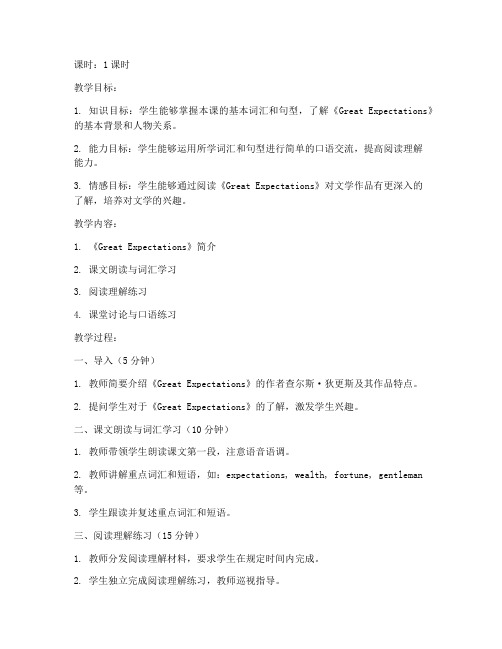
课时:1课时教学目标:1. 知识目标:学生能够掌握本课的基本词汇和句型,了解《Great Expectations》的基本背景和人物关系。
2. 能力目标:学生能够运用所学词汇和句型进行简单的口语交流,提高阅读理解能力。
3. 情感目标:学生能够通过阅读《Great Expectations》对文学作品有更深入的了解,培养对文学的兴趣。
教学内容:1. 《Great Expectations》简介2. 课文朗读与词汇学习3. 阅读理解练习4. 课堂讨论与口语练习教学过程:一、导入(5分钟)1. 教师简要介绍《Great Expectations》的作者查尔斯·狄更斯及其作品特点。
2. 提问学生对于《Great Expectations》的了解,激发学生兴趣。
二、课文朗读与词汇学习(10分钟)1. 教师带领学生朗读课文第一段,注意语音语调。
2. 教师讲解重点词汇和短语,如:expectations, wealth, fortune, gentleman 等。
3. 学生跟读并复述重点词汇和短语。
三、阅读理解练习(15分钟)1. 教师分发阅读理解材料,要求学生在规定时间内完成。
2. 学生独立完成阅读理解练习,教师巡视指导。
3. 教师组织学生交流阅读心得,总结文章主旨。
四、课堂讨论与口语练习(10分钟)1. 教师提出与课文相关的问题,如:主人公皮普的性格特点、故事背景等。
2. 学生分组讨论,每组派代表发言。
3. 教师点评并总结。
五、总结与作业布置(5分钟)1. 教师对本节课所学内容进行总结,强调重点。
2. 布置课后作业:预习课文第二段,准备下周课堂讨论。
教学反思:本节课通过课文朗读、词汇学习、阅读理解、课堂讨论等多种形式,使学生全面了解了《Great Expectations》的基本内容。
在教学过程中,教师应注重以下几点:1. 注重学生的参与度,鼓励学生积极发言。
2. 注重词汇和句型的实际运用,提高学生的口语表达能力。
高校教师资格证面试说课教案模板(优秀2篇)
高校教师资格证面试说课教案模板(优秀2篇)高中英语教师资格证说课稿篇一Unit 16 Lesson 63Hello, everyone. Today I’m very pleased to have an opportunity to talk about some of my teaching ideas. My topic is life in the oceans takenfromLesson 63 of Unit 16 in SEFC(2)。
It is made up of four parts.Part 1 My understanding of this lessonThe analysis of the teaching material:Teaching aims:1、 Knowledge aim: Understand the main idea of the text.2、 Ability aim: Retell the text in their own words.3、 Emotional aim: Make the Ss love the life of the sea and do something to stop it being polluted.Key points / Teaching important points:How to understand the text better.Teaching difficult points:1、 Use your own words to retell the text.2、 Discuss the pollution of the sea and how to save the sea.Something about the Ss:1、 The Ss have known something about the sea and sea life through the Internet and other ways.2、 They are lack of vocabulary.4、 Some Ss are not active in the class because they are afraid of making mistakes. Part 2 My teaching theories, methods and aidsTeaching method:Double activities teaching methodQuestion-and-answer activity teaching methodWatch-and-listen activityFree discussion methodPair work or individual work methodTeaching aids:1、 a projector2、 a tape recorder4、 the blackboardPart 3. Teaching steps / proceduresI have designed the following steps to train their ability of listening, speaking, reading and writing, especially reading ability.The entire steps are:Greetings, Revision, Lead-in and preparation for reading, Fast reading(scanning),Listening, Intensive reading, Preparation for details of the text, Consolidation, Discussion, HomeworkStep 1 GreetingsGreet the whole class as usual.Step 2. Revision1、 Ask students some questions to revise the last lesson(show them on the screen)。
教师资格证试讲教案(中英文)
Unit 4 in Book 1 (New Horizon)How to make a good impression?Li DanTeaching Objectives:This lesson is intended to explore other ways of good communication (nonverbal communication) in addition to words, feelings and senses. After learning it, Ss are expected tohave a better understanding about how to master as well as to present good communication signs in an English culture, such as appearance, eye contact,gestures, movements, etc;facilitate reading with one of the important reading skills--- reading for gist;be willing to imagine the scene while reading, which can make the reading interesting;be familiar with the usage and use of the new words and expressions Teaching Procedures:1.Warm-up! (2 min)“A good attitude can help you impress others”Mention a student’s homework last week and praise him for his good attitude.2.Leading-in activity (3 min)“What factors may affect your impression on others?What’s the way of making a good impression on others?”Work in pairs.Let Ss think out as many ways or factors as they can to impress others.Tell Ss they may get extra points as rewards so as to motivate them.3.Pre-reading activity (5 min)“Will the author think alike with us?”Ask Ss to listen for the first time for the main idea.Ask Ss to listen for detail information and answer 3 questions.Q1. How long does it take us to judge the people we meet?Q2. What is one way you can have a positive effect on other people?Q3. What is the key to being the best person you can be?Ask Ss to listen it for the last time to check their comprehension.4.Text comprehension (12 min)“W hat tips does the author offer us in order to make a good impression?”(3 min)Ask the class to: read through the text and get familiar with new words;find out what tips the author give us.Check students’ understanding and explain those tips in general.Tip 1: You are the message.Tip 2: Be yourself.Tip 3: Use your eyes.Tip 4: Lighten up.(5 min)Ask a student to read the first paragraph.Research shows we make up our minds about people through unspokencommunication within seven seconds of meeting them. Consciously orunconsciously, we show our true feelings with our eyes, faces, bodies andattitudes, causing a chain of reactions,ranging from comfort to fear.Explain useful phrases and translate the paragraph.(4 min)Suggest students image the scene when it comes to a real situation, which makes the text-reading much more interesting. Take paragraph 12 and 13 as an example.Focus on the underlined parts and imagine the atmosphere in the meeting room, especially the changing expression of the chairman.Lighten up. Once in a staff meeting, one of the most powerful chairmen in the entertainment industry became very angry over tiny problems, scolded each worker and enjoyed making them fear him. When he got to me, he shouted, "And you, Ales, what are you doing?"I said, "Do you mean now, this evening or for the rest of my life?" Therewas a moment of silence. Then the chairman threw back his head and roared with laughter.Others laughed too. Humor broke the stress of a very uncomfortable scene.5.AssignmentsAssign Ss to read the text carefully and find out what they can do to impress others. Remind them all the ideas should be written in imperative sentences.新视野大学英语第一册第四单元How to make a good impression?/如何留下好印象?教学目标:通过本节课的学习,以期达到如下目标:使学生更好地了解并应用非言语交流方式,如衣着,眼神,体态语等 让学生熟悉略读技能,以便更准更快的把握文章主要内容使学生学会积极想象故事情节勾画故事场景,使学习生动形象化让学生熟悉生词的意义和用法教学步骤:1.活跃气氛(2分钟)“好态度留下好印象!”老师课前提到上次课的作业情况,表扬某位成绩不好但是态度很端正的学生,告诉学生“态度可以改变一生”2.课前活动(3 分钟)问题:“哪些因素会影响别人对你的印象?”“有哪些方法可以帮助你留下好印象?”老师要求学生以同桌为组进行讨论:吩咐学生轻声讨论,用脑想,用笔记,答案最多的一组同学可以加分3.听力导入(5 分钟)问题:“课文的作者会有哪些不同的好方法呢?听第一遍:短文的大意听第二遍:回答3个问题第一次见面时,多长时间我们就会对彼此进行评价?♦给别人留下好印象的方法是什么?♦让自己表现最好的关键是什么?听第三遍:检查答案4.课文理解(12 分钟)要求学生略读全文,并回答问题:“文章中读者提到了哪些好点子?”学生回答,老师补充其内涵。
大学英语教师招聘试讲教案
一、课题大学英语精读课程二、教学目的1. 培养学生的英语阅读理解能力,提高学生的英语水平。
2. 增强学生对不同文化背景下的英语表达方式的理解。
3. 培养学生独立思考和分析问题的能力。
三、课型新授课四、课时1课时五、教学重点1. 理解文章的主旨和大意。
2. 掌握文章中的关键词汇和短语。
3. 分析文章的结构和写作技巧。
六、教学难点1. 理解文章中复杂句型的含义。
2. 分析作者的观点和态度。
3. 运用批判性思维对文章内容进行评价。
七、教学过程(一)导入新课1. 利用多媒体展示与课文相关的图片或视频,激发学生的兴趣。
2. 提问学生关于图片或视频的问题,引导学生思考。
3. 介绍本节课的课文内容,明确学习目标。
(二)讲授新课1. 阅读文章,学生分组讨论,找出文章中的关键词汇和短语。
2. 教师讲解关键词汇和短语,帮助学生理解文章。
3. 分析文章的结构和写作技巧,讲解作者的观点和态度。
4. 引导学生思考文章中的复杂句型,讲解其含义。
(三)巩固练习1. 学生完成课后练习题,巩固所学知识。
2. 教师对学生的练习进行讲解,纠正错误。
(四)归纳小结1. 总结本节课所学内容,强调重点和难点。
2. 鼓励学生在课后进行自主学习和复习。
(五)作业布置1. 完成课后阅读,分析文章的主题和结构。
2. 收集与课文相关的资料,进行小组讨论。
八、板书设计1. 课文标题2. 关键词汇和短语3. 文章结构4. 作者观点和态度九、教具1. 多媒体设备(电脑、投影仪)2. 课文文本3. 练习题十、教学反思本节课通过阅读理解、讨论和练习等多种教学手段,帮助学生提高英语阅读能力。
在教学过程中,要注意以下几点:1. 注重学生的主体地位,激发学生的学习兴趣。
2. 结合学生的实际情况,调整教学策略。
3. 关注学生的个体差异,因材施教。
4. 加强课堂互动,提高学生的参与度。
通过本次试讲,我将充分展示自己的教学能力和专业知识,为成为大学英语教师做好准备。
教师资格证考试面试高中英语教案模板+逐字稿词汇课
教师资格证考试-面试-高中英语-教案模板+逐字稿-词汇课一、教学目标1. 知识目标:a. 学生能够掌握并正确使用本课引入的词汇。
b. 学生能够通过上下文线索理解和记忆单词。
c. 学生能够运用所学生词进行简单的句子构建。
2. 技能目标:a. 学生能够通过图片、语境等线索猜测词义。
b. 学生能够通过词根词缀等策略扩大词汇量。
c. 学生能够运用英语进行简单的日常交流。
3. 情感目标:a. 学生能够培养对英语学习的兴趣和积极性。
b. 学生能够培养合作意识和团队精神。
二、教学内容1. 教材内容:本课将引入高中英语课程标准规定的词汇学习内容。
2. 教学重难点:学生对单词的正确理解和运用。
三、教学方法1. 交际法:通过情景模拟、角色扮演等方式,让学生在实际语境中运用所学词汇。
2. 情境教学法:利用图片、视频等教学资源,为学生提供丰富的语境,帮助学生理解和记忆单词。
3. 词根词缀法:引导学生通过分析词根词缀来猜测和记忆单词。
四、教学步骤1. 导入:利用图片、视频等资源,引入本课主题,激发学生兴趣。
2. 展示:教师展示本课要学习的词汇,引导学生观察单词的构成和特点。
3. 讲解:教师讲解单词的词义、词性和用法,并通过例句帮助学生理解和记忆。
4. 练习:学生通过填空、翻译等练习,巩固所学词汇。
5. 应用:学生分组进行角色扮演或情景模拟,实际运用所学词汇进行交流。
6. 反馈:教师对学生的学习情况进行总结和评价,及时反馈学生的学习成果。
五、作业布置1. 学生回家后,整理本课学习的词汇,制作单词卡片。
2. 学生结合所学词汇,编写一篇短文,展示对词汇的运用。
六、教学评价1. 课堂参与度:观察学生在课堂活动中的参与情况,是否积极回答问题、参与讨论。
2. 作业完成情况:检查学生作业的完成质量,包括单词卡片的制作和短文的编写。
3. 词汇运用能力:通过角色扮演、短文写作等环节,评估学生对所学词汇的理解和运用能力。
七、教学拓展1. 开展词汇竞赛:组织学生进行词汇竞赛,激发学生的学习兴趣和竞争意识。
- 1、下载文档前请自行甄别文档内容的完整性,平台不提供额外的编辑、内容补充、找答案等附加服务。
- 2、"仅部分预览"的文档,不可在线预览部分如存在完整性等问题,可反馈申请退款(可完整预览的文档不适用该条件!)。
- 3、如文档侵犯您的权益,请联系客服反馈,我们会尽快为您处理(人工客服工作时间:9:00-18:30)。
高校教师资格证(教案)申请人:申请科目:英语工作单位:身份证号:Teaching PlanTeacher:Target Audiences: second-year college students of non-English majorMaterial Selection:Looking for a job after university?First, get off the sofa from New Standard College English, Text A, Unit 1, Book 41. Teaching material1. To promote the students to know the individual examples of job searching and problems after graduation. This unit is intended to provide some effective suggestions of finding a job for the undergraduates. After learning it, students are expected to understand the present employment condition and make necessary preparations for their future job hunting in advance.2. Scan the text and understand the structure and useful expressions.2. Time allocation1st period: careful explanation of words and expressions2nd period: understanding the text3rd period: post-exercises and extensive exercises3. Teaching aimsKnowledge objectsTo study the usage of new words and phrases.To make the Ss know how to understand the word meaning from the aspects of the text context.To finish some exercises.Ability objectsTo develop t he Ss’ abilities of speaking, reading and writing. Focus on ability of speaking.4. Key and difficult pointsKey point: how the parents should do when helping their sons or daughters find a job.Difficult points:1. usage of new words and expressions;2. organizing a talk about the experiences of finding jobs by their own words. 5. Teaching approaches1. Students centered approach2. Group discussionTeaching procedures1. Background Information: asking the students thinking about a question: what was the social background in the year of 2008 to 2009? In 2008-2009, because of the global financial crisis and the recession, many employers were reducing their workforce. So for the graduates in that period, finding a job became harder and harder. After their final exams, some students rested in the summer before lookingfor jobs and then they found that it was difficult to find a job in their field or at the level they wanted. The passage addresses the problems of such new graduates who might be stuck at home and advises their parents to support their children. The passage also recommends finding jobs in a bar or supermarket than sitting unemployed at home is a good choice. Moreover, maybe this is more likely to lead to better employment later.2. Text analysisKey question: What is the effective way to find a good job as a new graduate according to the passage?Analysis:1. fork out: to spend money on something especially when you do not want to /pay fore.g. They had to fork out $100 to get the car repaired.2. odd: not regular or fixed/occasionale.g. I take the odd bit of exercise, but nothing regular.3. galvanize: shock sb into action.e.g. the manager’s arrival galvanized the workers into action.4. fraught: full of (worry and anxiety)e.g. Their marriage has been fraught with problems.There is no need to look so franght.5. revert: go back to something or doing somethinge.g. After a few weeks, everything reverted to the normal.He reverted to smoking under stress.6. proceed: continue to do somethinge.g. work is proceeding according to the plan.Don’t let me stop you, proceed with your work.Contrast—precede: happen or exist before something else/to go somewhere before sb elsee.g. This is a type of cloud that precedes rain.The guard preceded them down the corridor.7. slump: to lean against because not strong enough to stande.g. Tom slumped against the wall, defeated.decrease suddenly e.g. Sales slumped by 20% last year because of financial crisis.bend forward e.g. Her shoulders slumped and her eyes filled with tears.8. look on: a) watching something happen without taking part inb) to consider sb. or sth. in a particular waye.g. Nobody tried to help the old lady, they all looked on in silence.I look on him as a good friend.Intensive reading (interpretation of the text):1. Those memories of forking out thousands of pounds a year, so that he could eat well and go to the odd party, began to fade. Until now.Meaning: parents were proud on seeing their son graduate. But now they were thinking of the money they paid for his study and occasional social event because he could not find ajob.2. This former scion of Generation Y has morphed overnight into a member of Generation Grunt. Meaning: The distinguished son of Generation X(the parents’generation who worked hard, got jobs, and had good careers and expected their son to do the same) had changed into amember of Generation Grunt-he doesn’t seem to communicate much, lies around anddoesn’t get a job, or can only do a low-status routine job.3. I passed the exams, but at the interviews they accused me of being ‘too detached’ and talking in language that was ‘too technocratic’, which I didn’t think possible, but obviously it is. Meaning: Jack passed the entrance exams for a government post, but he was criticized in the interviews. They said he was not personally involved and used the language of atechnical expert or high authority. As a new graduate he probably wanted to show hisexpertise so he can not understand this criticism.4. For the rest it is 9-to-5 “chilling” before heading to the pubMeaning: the rest of my friends do not have a routine low-status job (like stacking goods on a supermarket shelf) and chill out(relax) all day and go to pub for a drink in the evening.5. I went to a comprehensive and I worked my backside off to go to a good university…Meaning: Jack went to a school for students of all levels, so he had to work very hard to enter a good university.6.Carry on life as normal and don’t allow them to abuse your bank account or sap your reserves of emotional energy.Meaning: the advice from Gael Lindenfield here is that parents should live as usual; they should neither let their children spend their money unnecessarily, nor let the problem use up alltheir energy and emotions.7. After that the son or daughter needs to be nudged firmly back into the saddle.Meaning: the parents should push their children firmly so that they get back into control of their lives (continue to find a job)Text Structure:Part I (paragraph 1,2,3): This part tells us the social situation and employment stress the new graduates confront.Part II (paragraph 4-9): This part shows us the job-hunting experiences of Jack and his parents’ attitude toward him when he could not find a jobPart III (paragraph 10-16): This part tells us how the parents should do when helping their children find jobs and how the graduates should do when they can’t find a good job.Assignment:1.Review the text2.Try to finish the post-exercises。
